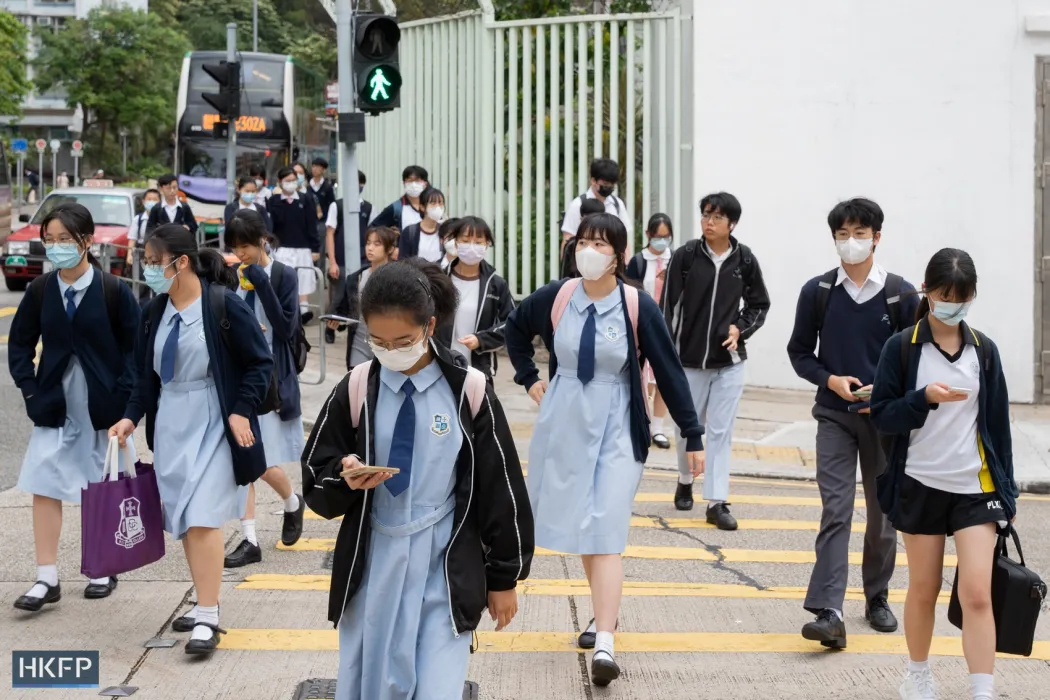Hong Kong secondary school students’ performance in maths and reading has fallen in a global assessment amid a general decline internationally over the Covid-19 pandemic.

The Programme for International Student Assessment (PISA), a global study that evaluates the maths, science, and the mother-tongue reading literacy of 15-year-old students, found that the maths and reading scores among Hongkongers dropped in 2022, compared to their results in the previous assessment in 2018. Meanwhile, they scored slightly higher in science.
It marked the first time Hong Kong students had dropped out of the global top 10 for reading literacy since the study began in 2000, behind places including Singapore, Japan, and Taiwan. They scored 500 in 2022, down from 524 in 2018.
Hong Kong students remained in fourth place for maths, behind Singapore, Macau, and Taiwan, despite their scores dropping from 551 to 540. They ranked seventh for science, up two places from 2018, with scores increasing from 517 to 520.
The Chinese University of Hong Kong (CUHK), which was commissioned by the city’s Education Bureau to conduct the PISA study locally, announced the findings on Tuesday.
During May and July last year, nearly 6,000 students at 163 randomly selected Hong Kong secondary schools participated in the global test, after it was postponed due to the Covid-19 pandemic. The study is normally conducted every three years.
Researchers said they had observed a general decline of performance among the 81 countries and economies in the PISA study, organised by the Organisation for Economic Co-operation and Development.

More than 30 countries and economies witnessed a drop in maths and reading scores, the researchers said. But most maintained relatively stable science scores.
The decline in international averages could be attributed to the global disruption of normal schooling, according to the researchers. On average, 50 per cent of students participating in the global study had experienced school closures exceeding three months.
“During the assessment, Hong Kong was recovering from its fifth Covid-19 wave, with secondary schools maintaining half-day sessions,” according to a summary of the study from CUHK.
But Hong Kong students continued to rank high, and their scores remained above international averages, the researchers said.
They also said the more palpable drop in reading competency among local students could be related to time being unequally allocated to subjects as classed were disrupted and schooling went online.

“During the Covid-19 pandemic, students likely allocated more time to subjects like science and mathematics, which are comparatively easy to evaluate. In contrast, progress in reading may have been deprioritised,” the summary read.
Educational equity
The PISA study also found that Hong Kong ranked second globally regarding educational equity, with 17 per cent of socio-economically disadvantaged students ranked in the top quartile in maths. The average for OECD countries was 10 per cent.
The researchers at CUHK said the finding indicated “successful support” for students from underprivileged backgrounds.
They also noted that immigrant students’ performance was on par with local students across all assessment areas – 8 per cent were first-generation immigrants. The results “highlight[ed] Hong Kong’s commitment to inclusive education and support for all student groups,” the researchers said.
The Education Bureau said on Tuesday that the PISA study showed local students’ steady performance, which continuously surpassed international averages.
Last month, the Education Bureau released the results of the local Territory-Wide System Assessment (TSA) tests, which was resumed after being suspended for three years during the pandemic. While the results saw a decline in performance, the authorities said it was “not appropriate” to draw conclusions due to the challenges brought by the pandemic.
Support HKFP | Policies & Ethics | Error/typo? | Contact Us | Newsletter | Transparency & Annual Report | Apps
Help safeguard press freedom & keep HKFP free for all readers by supporting our team

LATEST FROM HKFP
HKFP has an impartial stance, transparent funding, and balanced coverage guided by an Ethics Code and Corrections Policy.
Support press freedom & help us surpass 1,000 monthly Patrons: 100% independent, governed by an ethics code & not-for-profit.










